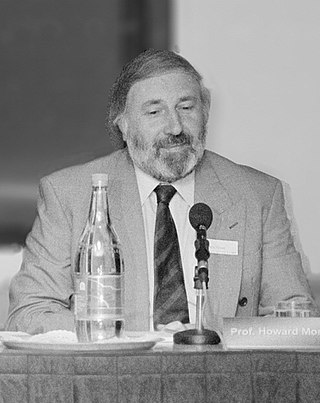Povl Riis (1925-2017) was a Danish gastroenterologist.
The Commission on Human Medicines (CHM) is a committee of the UK's Medicines and Healthcare products Regulatory Agency. It was formed in October 2005, and assumed the responsibilities of the Medicines Commission and the Committee on Safety of Medicines. Membership in this various and extensive body is listed on a governmental website.
Sir Peter Stanley Harper was a British physician and academic who was University Research Professor (Emeritus) in Human Genetics at Cardiff University. His work focused on researching neurogenetics and has resulted in discoveries concerning muscular dystrophies and Huntington's disease. He was knighted in 2004 for services to medicine.
Martin Bobrow is a British geneticist, and Emeritus Fellow, Wolfson College, Cambridge.
Roderick John Flower, also known as Rod, is a British pharmacologist, and professor at Barts and The London School of Medicine and Dentistry. Dr. Flower is a member of the board of directors of Antibe Therapeutics and on the scientific advisory board of Morria.

Elizabeth Matilda Tansey is an Emerita Professor of the history of medicine and former neurochemist, best known for her role in the Wellcome Trust's witness seminars. She previously worked at Queen Mary University of London (QMUL).
Anthony Seaton qualified in medicine from Cambridge University in 1962, and after training in Liverpool was appointed assistant professor of medicine at the University of West Virginia, USA in 1969. He became consulting chest physician at the University of Wales in 1971, and was named director of the Institute of Occupational Medicine at Edinburgh in 1978. Seaton became the head of the Department of Environmental and Occupational Medicine at the University of Aberdeen in 1988 and on retiring in 2003 became emeritus professor. He continues to write and teach and has active research interests in the causes of asthma and occupational illness.
The History of Modern Biomedicine Research Group (HoMBRG) is an academic organisation specialising in recording and publishing the oral history of twentieth and twenty-first century biomedicine. It was established in 1990 as the Wellcome Trust's History of Twentieth Century Medicine Group, and reconstituted in October 2010 as part of the School of History at Queen Mary University of London.
Professor Miles Weatherall (1920-2007) was a British pharmacologist.

Howard Redfern Morris FRS is a British biochemist.
Leslie Lars Iversen, was a British pharmacologist, known for his work on the neurochemistry of neurotransmission.
John Richard Batchelor FRCPath, FRCP, known as Richard, was a British immunologist, specialising in transplant immunology.
Sir Adolf William Asscher was a Dutch-born British consultant nephrologist.

Professor Alastair Vincent Campbell MA, BD, Th.D., FRSE is a British theologian and bioethicist. He was the founding editor of the Journal of Medical Ethics and received the Henry K. Beecher award from the Hastings Centre in 1999.
Sir Marcus Henry Richmond,, known as Mark Richmond, is a British biochemist, microbiologist and academic.
Professor Hubert Frank Woods (1937-2016), known as Frank, was a British pharmacologist.
Jeffrey Kenneth Aronson is a British clinical pharmacologist.
Sir Alasdair Muir Breckenridge, was a Scottish pharmacologist.
Professor Donald Macleod FRCSEd, FFAEM (Hon), FFSEM (Hon), FISM was a Scottish former rugby union player and a former President of the Scottish Rugby Union. A retired surgeon, he was the Scotland national rugby union team doctor for many years.
Sir Graham Allan Hart is a British retired civil servant.


